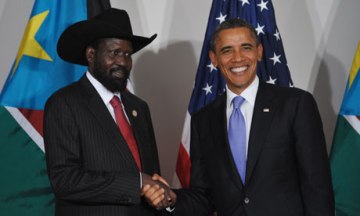South Sudan’s Kiir congratulates Obama on “impressive victory”
November 7, 2012 (WASHINGTON) – South Sudan president Salva Kiir sent a congratulatory cable to his United States counterpart Barack Obama on his re-election for a second and last term yesterday calling it an “impressive victory”.
 “On behalf of the people of the Republic of South Sudan and on my own behalf, I extend our congratulations on your impressive victory in the United States of America’s presidential election and on the vote of support you received from the citizens of your country. I sincerely wish you a good health, personal happiness and every success in taking on the new responsibilities and ensuring well-being, security in the World and in our region” Kiir said according to a copy of the letter obtained by Sudan Tribune.
“On behalf of the people of the Republic of South Sudan and on my own behalf, I extend our congratulations on your impressive victory in the United States of America’s presidential election and on the vote of support you received from the citizens of your country. I sincerely wish you a good health, personal happiness and every success in taking on the new responsibilities and ensuring well-being, security in the World and in our region” Kiir said according to a copy of the letter obtained by Sudan Tribune.
South Sudan’s leader also expressed satisfaction with his country’s ties with the US asserting it is “built in the spirit of shared commitment to democratic stable, united and prosperous South Sudan”.
“Our joint work to ensure regional stability and close people to people contacts will continue to promote mutual understanding and dialogue between the United States and South Sudan, while our common efforts will overcome all challenges,” Kiir said in his letter.
“I strongly believe and hope that cooperation between United States and South Sudan under your leadership will be further developed and enhanced”.
The Obama administration made its top priority to ensure the success of the referendum that took place in January 2011 by which South Sudanese were to decide on whether they want to establish their own country or remain with the north as one nation.
The result of the vote came almost unanimously in favor of secession and Khartoum swiftly recognized the new state when it officially came into existence on July 2011. The peaceful divorce between North and South Sudan was hailed as an accomplishment of the Obama administration which went as far as promising Khartoum the partial lifting of sanctions in return for allowing the partition to take place without issues.
But relations between Washington and Juba has been marked by silent tensions as the former watched with dissatisfaction what they saw as bad decisions by the new state.
The first time the leaders of the two countries met on the sidelines of the United Nations General Assembly last year, Kiir was thirty minutes late according to a report that appeared on McClatchy Newspapers.
During the discussions Obama pressed Kiir on ending support for the Sudan People Liberation Movement North (SPLM-N) rebels fighting Khartoum in the border states of Blue Nile and South Kordofan.
Kiir denied backing the rebels, angering the White House, which had strong intelligence linking South Sudan’s army to the SPLM-N. Washington was concerned that the fighting could reignite the civil war which came to a halt in 2005.
Weeks later, during a follow-up phone call, Kiir again denied his military’s support for the rebels. The South Sudanese leader then followed up with a personal letter to Obama that a former US official familiar with its contents described as an “apology letter.”
In that letter, Kiir wrote that he did know about his military’s support to the Sudanese rebels, but he could not admit that to Obama because his advisers were in the room and they did not know he was aware of that support. Kiir said he was working to lessen the support.
A former US official said the letter was received “incredibly poorly” by the White House. Things got worse when the US felt again it was lied to last April during an Obama-Kiir phone call following days of border clashes between South Sudan and Sudan.
In that call, Kiir told Obama that South Sudan would not send forces north to seize Heglig, a Sudanese-controlled oilfield. Eight days later, South Sudanese forces overran the area and held it for 10 days amid international condemnation.
This among other reasons explains why some South Sudanese officials have privately expressed hope that the US Republican challenger Mitt Romney would beat Obama.
Juba felt betrayed over what it perceived as bias in favor of Khartoum particularly during the sensitive oil negotiations that were aimed at restoring oil exports through Sudan. Because of a dispute on transit fees, Khartoum started seizing part of the oil to make up for uncollected duties. Juba retaliated by suspending suspended oil production altogether.
South Sudan chief negotiator Pagan Amum singled out the US and UK for being critical of Juba regarding its oil shutdown decision.
“They never talked about it though they knew it was wrong. Sudanese government was practically stealing our oil but they continued to keep quiet….[rather than] asking Khartoum to pay back what it stole” Amum told reporters last August.
The US has also been pressing South Sudan both privately and publicly on issues of transparency, human rights, corruption and good governance.
(ST)
